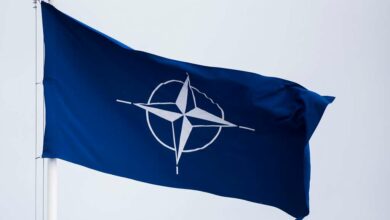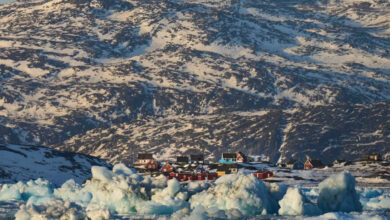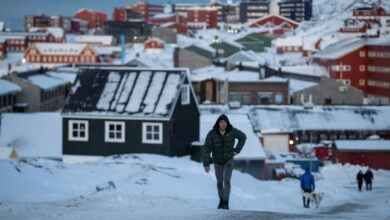Benghazi–NATO and the European Union begin talks on Thursday on a possible "no-fly" zone over Libya after some of the fiercest fighting of the three-week-old uprising against Muammar Qadhafi.
A Libyan insurgent said rebels had retaken the heart of Zawiyah, the closest city to Qadhafi's stronghold of Tripoli, from government forces on Wednesday, after it appeared to change hands twice during the day in a hard-fought battle.
The Pentagon said it was preparing a "full range" of military options for Libya, including a no-fly zone, with the plans to be discussed by NATO ministers at talks in Brussels, while military officers said a zone could be set up quickly.
Rebel forces have appealed to Washington and its allies to impose a no-fly zone to deny Qadhafi's forces the advantage of using warplanes and to prevent him moving troops by helicopter.
During fighting in the east, an engineer told Al-Jazeera on Wednesday he had seen warplanes strike oil facilities, apparently the first time such a complex was hit. The attack sent a towering column of black smoke and flames into the sky.
"If requested and if needed we can respond at very short notice. There are a lot of sensitivities in the region as regards what might be considered foreign military interference," NATO Secretary-General Anders Fogh Rasmussen told Sky News.
Italy, whose bases could play a critical role in any military action, has said it will back any decisions taken by NATO, the EU or the United Nations, clearing the way for US naval forces based in Naples to be deployed if needed.
US Secretary of State Hillary Clinton has made it clear imposing a no-fly zone is a matter for the United Nations and should not be a US-led initiative. Russia and China, permanent members of the UN Security Council, are cool to the idea, which could entail bombing Libyan air defenses as a first step.
LINE IN THE DESERT
Counter-attacks by Qadhafi loyalists suggest the flamboyant leader, in power for four decades, will not go as quietly or quickly as fellow leaders in Egypt and Tunisia did in a tide of popular unrest rolling across the Arab world.
An upsurge of fighting appears to have cemented a de facto split of the oil-producing desert state, Africa's fourth biggest, into a government-held western area around Tripoli and an eastern region held by ragged but dedicated rebel forces.
One of Qadhafi's sons has warned of civil war among Libya's tribes if his father steps down.
EU foreign ministers also meet to discuss North Africa in Brussels on Thursday, with the focus on how the bloc can support the process of transition in Egypt and Tunisia, while using sanctions and other means to apply pressure to Qadhafi.
Two members of Libya's opposition council visited the European Parliament on Wednesday and made clear they wanted EU moral support, political recognition and a no-fly zone that protects the territory they hold, but did not want any form of foreign military intervention.
In another move to isolate the Libyan leader diplomatically, Russia will ban all weapons sales to Libya, the Kremlin said in a statement on Thursday, effectively suspending its arms contracts with the government of Qadhafi.
The daily Kommersant cited a source last week as saying Russia had US$2 billion worth of arms contracts with Libya and was close to concluding deals to sell military aircraft and anti-aircraft missiles worth another US$1.8 billion.
The White House on Wednesday defended its response to the turmoil in Libya, insisting it had taken dramatic action and rejecting criticism that it had been too cautious.
"There has never been a situation where the international community, with leadership by the United States, has acted as quickly as it has to respond to this kind of situation," spokesman Jay Carney said.
A senior US general said the United States military was prepared to quickly establish a "no-fly" zone over Libya if the international community decided on that option.
"I believe within a couple days, we would probably be able to implement a no-fly zone," General Raymond Odierno, commander of the US Joint Forces Command said.
Qadhafi tried to crush the uprising by bombarding Zawiyah and the front lines of the rebel-held east of the country where rebels have set up a headquarters in the second city of Benghazi and where their forces occupy swathes of the country.
The Zawiyah rebel fighter, who gave his name as Ibrahim, told Reuters by telephone: "Thanks to Allah we are sitting in the square now." He earlier reported his forces had pulled back.
"This is a life or death battle for us, we have nothing to do now but to fight him," he said.
A doctor in the town said many dead lay in the streets, including old people, women and children, with at least 40 killed, probably many more. He also said the rebels had been driven from the center earlier in the day.
The government stuck by its earlier report that its forces had driven rebels from the center and state television said people there were celebrating victory over "terrorist gangs."
The counter-offensive by Qadhafi has halted the rebels' advance in the east, where they were forced to withdraw from the front-line town of Bin Jawad after coming under heavy shelling.
"We came into Bin Jawad but gunboats fired on us so we withdrew," one fighter, Adel Yahya, said. Rebel colonel Bashir Abdul Qadr appeared unsure whether naval vessels had been used. "We had bombing from the direction of the sea," he said.
At the same time, the Libyan government appeared to be putting out feelers toward Western governments which have tried to isolate Gaddafi with financial sanctions and were discussing further measures to try to stop the violence and force him out.
SITUATION FLUID
Libyan government emissaries appeared to have flown to Brussels to talk to EU and NATO officials meeting on Thursday and Friday, Italian Foreign Minister Franco Frattini said, suggesting the situation was fluid.
Portugal said a Qadhafi envoy met its foreign minister on Wednesday to explain Tripoli's view of the conflict and Greece said another would meet Greek Deputy Foreign Minister Dimitris Dollis on Thursday.
Rebels in the east faced a new barrage of artillery fire on their desert front line outside the oil port of Ras Lanuf and said government forces had hit an oil pipeline leading to Sidrah, about 550 km (340 miles) east of Tripoli. State television blamed "Al-Qaeda-backed" armed elements.
Dr Gebril Hewadi of the Benghazi medical management committee told Reuters television at least 400 people had been killed in eastern Libya since clashes began there on 17 February, with many corpses yet to be recovered from bomb sites.
Libya's top oil official said the unrest had cut output to about half a million barrels per day from 1.6 million, but the oil industry was still centrally coordinated.
Brent crude oil rebounded above US$116 a barrel, renewing fears global economic recovery could be hit.
Qadhafi has said he will die in Libya rather than flee. But a Libyan-born analyst said Qadhafi's inner circle had approached countries in Africa and Latin America about giving him refuge.



